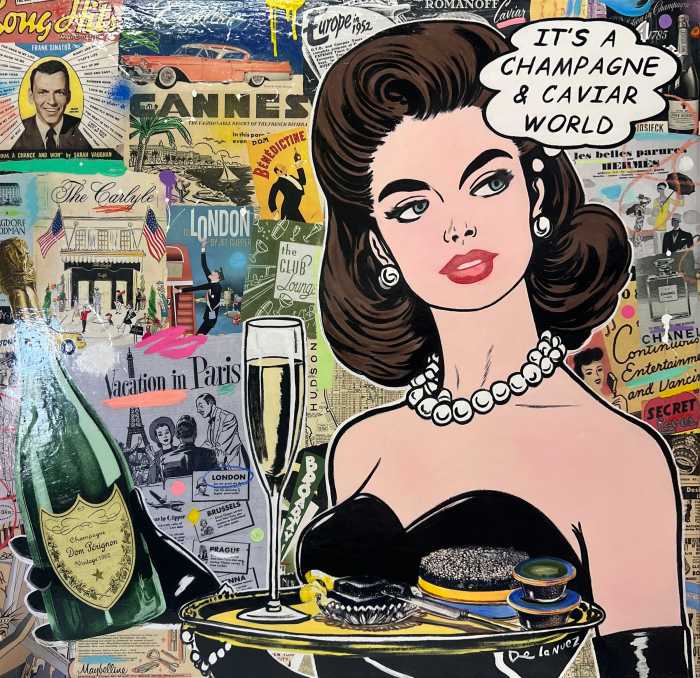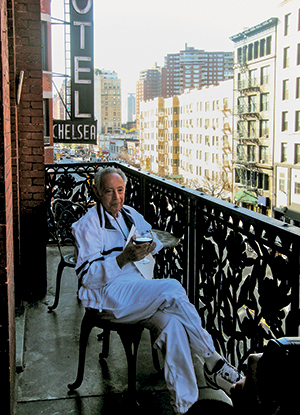
BY PUMA PERL | “Living in the Chelsea Hotel,” Linda Troeller’s recently published book, looks back — in words and photographs — at her two decades as a resident of the historic and cultural landmark.
For Troeller, the Chelsea was both sanctuary and muse, guiding her through a spiritual journey she calls “art in the near” — where the boundaries between the artist’s life and a separate “regular” existence fade away, and where creative energy defines and shapes love and friendships. As per the late Herbert Huncke, “Live glory days, and if you have too many lost days, meet new people, swing around again and almost anything can happen here.”
Troeller had already become a well-known visual artist when, in 1994, she was introduced to Stanley Bard, the manager of the Chelsea Hotel. She grew up in New Jersey and says she always knew she was headed for the arts, despite her mother’s early hopes that she would “enjoy the life of a wife and eventually have a child.”
It was not until she watched a documentary about Ansel Adams, who Troeller had assisted in workshops, that she began to support her daughter’s photographic dreams. She was the inspiration for one of Troeller’s most intimate works — 1988’s “TB-AIDS Diary,” a photo collage series that recalls her mother’s 1930s struggle with tuberculosis while recounting the story of another mother who lost her son to HIV-related illness.
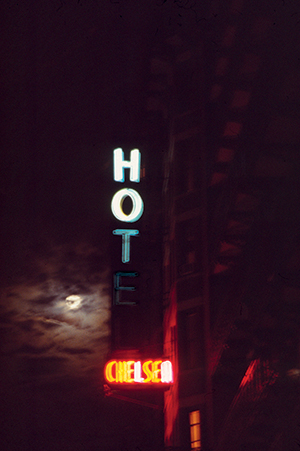
In an especially moving part of the “Chelsea Hotel” book, Troeller describes her depression after the loss of her mother, and the comfort she received when a staff housekeeper, in the midst of a chore, turned to her and warmly embraced her.
Healing has been an ongoing theme of Troeller’s work — award-winning photographs are included in her book “Healing Waters,” an exploration of water therapy all around the world. Two of her other books, “The Erotic Lives of Women” and “Orgasm,” traverse the sexuality of women far beyond the usual acceptable borders.
Writer and journalist Victor Bockris, in his foreword, describes the photographs as “emerging out of darkness or flitting between shadow and visions.”
As presented by Troeller, the hotel itself is as vital and fluid a character as its inhabitants. “Memory is also in the muscles,” she writes, “especially the heart muscles.”
She coped with her eviction from the hotel by “falling into a daydream,” imagining a healer sprinkling her with lotion and twirling her in circles to find a new way. The saturated color and dreamlike images of the hotel, contrasting with the desolation as the building is vacated, evince the photographer’s long journey to acceptance of the loss of her community and home.
One feels both the communal spirit and the introspection of the subjects in the portraits — especially the self-portraits. Troeller describes the series as “reflecting the turmoil around me.”
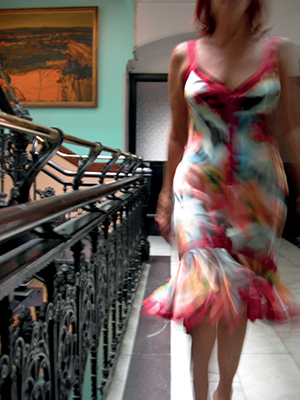
In a 2006 self-portrait, we see Troeller breezing through a hallway, wearing a Zac Posen dress that seems to be made of watercolors floating around her. A later photo, created in 2012 (and recently declared a finalist for the Magdalena exhibition), reveals only her eye, staring almost despairingly into the camera beside a portrait of Mary.
“I believe in the power of cultural memory and that the creative ‘input and output’ that’s evolved at the historic Chelsea Hotel will emerge in a new way,” said Troeller. “These photographs of my visual journey are there to keep reminding us of the power of place, and social and physical borderlines. The Chelsea Hotel is where I have felt the most comfortable being an artist, and I hope many artists can utilize it in some way when it reemerges as a hotel.”
One of Troeller’s first associates, when she moved into an eighth floor room shortly after meeting Bard, was Herbert Huncke, who lived across the hall. His first words to her, after noticing a Chanel jacket in her possession, were: “You look like you’re a divorcee. It would be nice to have someone rich on this floor.”
Despite learning that his initial assessment was incorrect, they became fast friends, developing a ritual in which she’d spot him a few dollars to get to his daily methadone program, and he’d pay her back by reciting his poetry over coffee in his favorite diner when he returned.
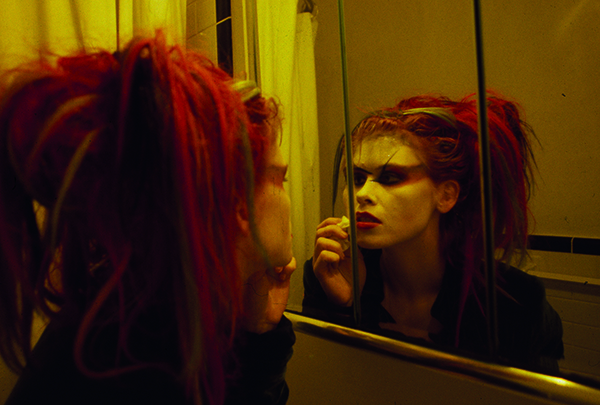
The relationships Troeller developed were multi-faceted, leading to lifelong friendships as well as creative collaborations and influences. And love — in a 2006 interview on the Hotel Chelsea blog, Troeller mentions “finding a snake and my husband” during her tenancy. One photo in the book reveals the man she would eventually marry, Lothan Troeller, lying in bed beneath an Andres Serrano portrait of Linda, one of many photos within a photo contained in the book.
Another of the many artists whom she met and shared influences with was designer Alexander McQueen, who came to see her photographs in the lobby and invited her to a show. “His use of partial nudity, the dark colors of war, and the pale lace of peace inspired me,” she said. “I got away from direct narrative string editing, and let photographs talk more to each other in structure and frame. Color, unusual color, any colors became exciting material.”
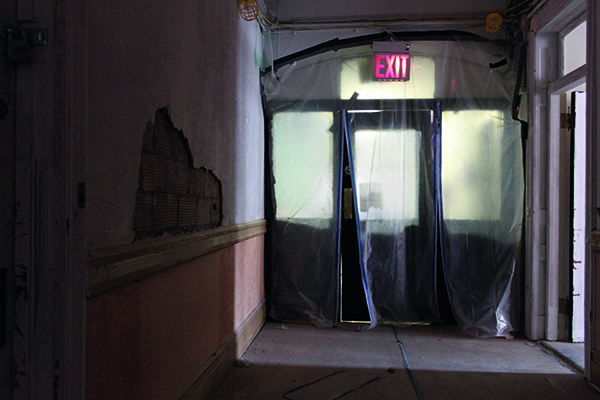
Troeller had to give up the eviction fight eventually due to the dust and toxins. She spent a year on this book, “a story about dear remembrance and photos of good times and bad times. Many of the residents that I met still live amid the renovation and have continued creative projects.”
She is looking forward to co-hosting an upcoming party among friends celebrating the 80th birthday of music composer Gerald Busby, a longtime resident. Included is a screening of Jessica Robinson’s film about his odyssey, “The Man on the Fifth Floor.”
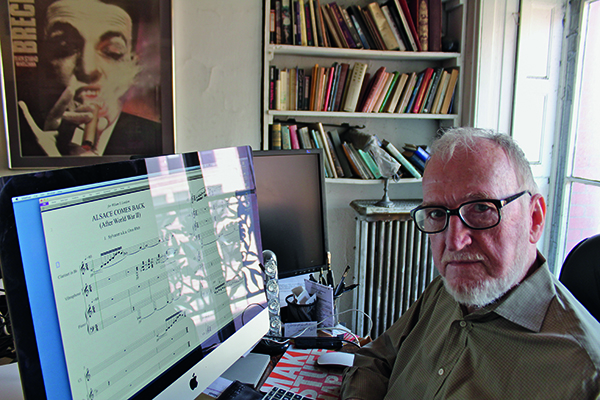
“We have to keep going,” Troeller told me the first time we spoke. “We have to keep going even if we don’t know where we are going to. There’s no reason something good can’t come out of this.”
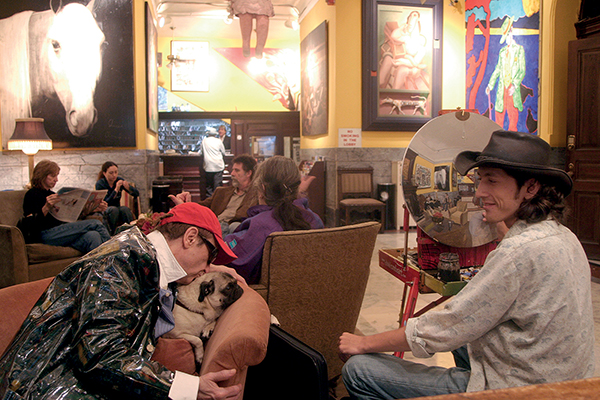
“Living in the Chelsea Hotel” (2015, Schiffer Publishing, $34.99) is available at bookstores, online retailers, or schifferbooks.com. Linda Troeller will give a presentation and sign books on Wed., Dec. 16, 1–3 p.m. at B&H Event Space (420 Ninth Ave., at W. 34th St.). Artist info at lindatroeller.com. Learn more about “The Man on the Fifth Floor” at busybusbyfilms.com.





